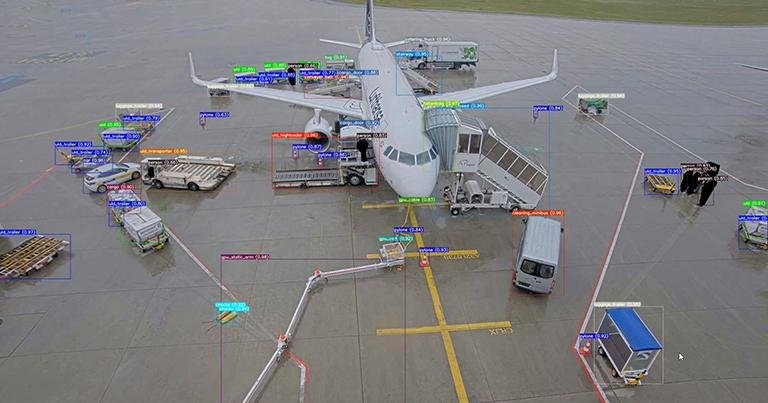Travel AI Innovations
Lufthansa & Fraport collaborate on AI-supported ground processes

Lufthansa and Fraport – a Corporate Partner of the FTE Digital, Innovation & Startup Hub – have signed an agreement to further optimise aircraft handling at Frankfurt Airport. Together with zeroG, a Lufthansa subsidiary, the partners are introducing an innovative, artificial intelligence (AI)-based camera solution called ‘seer’. The goal is to use real-time data to make the turnaround process more transparent, punctual, and efficient.
Every step of the aircraft handling process – from docking the passenger boarding bridge to loading baggage and refuelling at the aircraft position – is recorded by a camera. The AI system then automatically timestamps each process step. This increases both the quantity and quality of the available information, which is bundled in a central database, serving as a ‘single source of truth’.
The AI-supported turnaround process is the result of an intensive development and pilot phase that began in 2023. From February to May 2024, Lufthansa and Fraport tested the system at selected aircraft parking positions at Frankfurt Airport. Currently, ‘seer’ is being used at five aircraft parking positions. The number of positions is expected to rise to 20 by the end of the third quarter this year. This will be followed by a gradual, comprehensive rollout at Frankfurt Airport.
“Transparent ground processes enable us to further improve our punctuality and service quality,” said Jens Ritter, CEO, Lufthansa Airlines. “This benefits our guests in particular. That is why we are working intensively on modernising our operational processes with innovative technologies such as the AI-based ‘seer’ solution. When all partners at Frankfurt Airport use their handling data and share it with each other, we can become even more efficient and punctual together.”
Lufthansa is contributing its extensive operational experience to the project, combining it with Fraport’s expertise in airport management. zeroG brings together the requirements of both the airline and the airport, developing the entire underlying AI and computer vision intelligence that forms the technological core of ‘seer’ and ensures seamless integration into existing processes. All airlines and system partners at Frankfurt Airport will benefit from ‘seer’.
“At Fraport, we are advancing a wide range of AI solutions to optimise processes at our airports, reduce the workload for employees, and increase satisfaction among our passengers and customers,” said Stefan Schulte, CEO, Fraport AG. “The AI-supported turnaround is a perfect example of this approach. Enhanced data transparency provides our employees and partners with a more precise overview of each step involved in aircraft handling, enabling them to adapt subsequent work steps accordingly. This not only has a positive effect on each handling process but also benefits overall airport operations.”
The close cooperation between Lufthansa, Fraport and zeroG is an example of successful partnership in aviation. Together, the partners are developing and implementing innovations that strengthen Frankfurt and its airport, while simultaneously setting international standards.
“Aircraft don’t earn money while on the ground – yet this is where the most complex processes take place under intense time pressure,” said Manuel van Esch, Managing Director, zeroG. “This is exactly where our solution helps: with the support of camera-based AI models, we make processes visible, analysable, and controllable – in real time. This brings greater transparency for airlines and airport operators, while also improving punctuality and resource utilisation.”
Hear more from Lufthansa and Fraport at FTE Global – the “CES of Aviation” taking place in Long Beach, California, on 9 to 11 September 2025. Anja Schuhmacher, Senior Manager Airport Experience & Partnerships, Lufthansa, is participating in a session focused on ‘Achieving a revolution in baggage by 2030’. Meanwhile, Jens Sanner, Program Director for Digital Services and Transformation, Fraport, is speaking in a session on ‘Advancing Digital Identity & Seamless Travel Efforts’.
View the full FTE Global 2025 conference agendas >>
Register for FTE Global 2025 >>
Groundbreaking FTE Smart Ramp program, accelerating automation and collaborative innovation
Smart Ramp is the latest initiative as part of the groundbreaking FTE Accelerating Collaboration & Engagement (ACE) platform launched in partnership with innovation consultancy nlmtd. ACE is dedicated to driving real collaborative action among stakeholders, facilitating fast progress and dynamic change in key areas of the aviation industry which are ripe for transformation. International Airlines Group, Miami International Airport, All Nippon Airways, Royal Schiphol Group, KLM Royal Dutch Airlines, and Metropolitan Washington Airports Authority are all members of what is a truly global collaborative innovation initiative.
The focus on Smart Ramp operations has the ultimate goal that aircraft turnaround can be achieved autonomously and more efficiently. A phased approach will assess which solutions truly work by each member testing new technologies, while incorporating requirements from the other participants. The program will support startups and introduce new suppliers not yet active in aviation, forging paths together on how to overcome hurdles while also exploring the potential for shared investments in the future. Results of the innovations will be shared with respective experts, industry bodies and regulators, meaning the outcomes can be used to create recommended practices and standards in the industry.
Rapid progress has been made since the launch of Smart Ramp and the innovation challenges already planned by members include some 20 projects across eight airports in 2025. These include All Nippon Airways implementing autonomous towing tractors for cargo transportation to efficiently move cargo from the warehouse to the apron, reducing the need for manual labour in operations.
You may also be interested in
Travel AI Innovations
New Travel Tech Innovations: AI Tools, Strategic Partnerships, and Cutting-Edge Developments in the U.S., Japan, Germany, UK, Canada, Australia, and India

Monday, August 4, 2025
The travel and tourism sector is now undergoing a significant shift with the use of sophisticated technologies like artificial intelligence (AI) and global collaborations, as well as new innovations that shift business operations and the way travelers plan and experience their journeys. Recent advancements by industry leaders illustrate the adoption of new technologies to not only improve operational efficiencies, but, to achieve customer experience and transform globalization of tourism.
In particular, the travel and tourism tech adoption leaders are the USA, Japan, Germany, UK, Australia, Canada and India. These countries are creating a digitally enabled tourism ecosystem that is attractive to global travelers while helping local businesses to remain competitive in the new technology driven environment.Most Noteworthy AI Innovations and Business Collaborations
Revenue management system by BEONx and Micros South Africa
In collaboration with BEONx, Micros South Africa, a branch of Adapt IT, is leveraging AI-based revenue management systems for South Africa’s hospitality sector. This partnership extends the reach of BEONx sophisticated revenue management systems to more hotels by offering automated pricing, better forecasting, and a more responsive adaptation to changing market conditions. The partnership also provides local market knowledge from Micros South Africa, which enhances seamless implementation and support throughout the jurisdiction. The use of artificial intelligence to enable ease of doing business and improve the accuracy of operations, along with the enhancement of tourism infrastructure, sets the South Africa hospitality sector on a new and modern trajectory.
Teplis Travel and Spotnana’s Integrated Global Travel Platform
Teplis Travel has collaborated with Spotnana to create a unified global travel platform that combines Teplis’ customer-centric services with Spotnana’s cloud-based travel ecosystem. The platform offers travel management companies (TMCs) operational data access and integrated self-service platforms alongside automated processes. Teplis Travel is able to upgrade and optimize services with greater operational efficiency due to the modernized travel infrastructure provided by Spotnana and the global growth of corporate travel. This partnership illustrates the use of digital technologies to enhance the operational efficiency of the corporate travel ecosystem in the United States.
AI-Enabled Platforms for Operators and Travelers
Integrating PayPal and Other Payment Methods into Rezio
As a subsidiary of KKday, Rezio’s partnerships with PayPal and PAYUNi expanded its mid and small sized operator payment systems to cross border and local payments. This serves to improve travel business efficiency on payments for both international and domestic clients. Rezio is now able to offer immersive virtual tours through collaborations with iStaging, which helps travelers to get more interactive experiences prior to purchasing trips. Coupled with transformation subsidy programs for digital platforms, these advancements are accelerating digital technology adoption in tourism by smaller operators in Canada and Japan.
GuideGeek AI Travel Tools for Certain Destinations
Institutions such as Colorado Tourism Office (U.S.), NYC Tourism and Conventions (U.S.), and Tourism New Zealand have adopted GuideGeek platform’s AI tools. Accessed through customized interfaces such as “Colorado Concierge” and “Libby” for NYC, travelers receive tailored itineraries, localized tips, and dynamic notifications. New Zealand’s AI trip planner and its destination showcase in Minecraft exemplify how interactive technology can be used to engage younger travelers while providing comprehensive real-time local insights. Other countries like Germany and the UK have, to some extent, adopted the technology in attempt to enhance destination marketing and streamline visitor bookings.
Eviivo’s Integration of SMS and WhatsApp for Improved Communication
Eviivo, a company in hospitality technology, has integrated SMS and WhatsApp with its guest management system for hotels and short-term rentals, making communication on guest management systems simpler through the use of AI. Through real-time, two-way messaging over SMS and WhatsApp, which are the most used messaging platforms by guests, Eviivo streamlines communication, improves guest engagement, declutters email communication, and improves the overall guest experience. This solution has been effective in Australia and India.
New Alliances and Strategic Collaborations
Wheelhouse and Casago on Pricing and Revenue Management
Casago has chosen Wheelhouse as its exclusive pricing and revenue management partner after the latter acquired Vacasa in May 2025. This partnership stems from a year-long technology vendor evaluation. It gives Casago the flexibility to implement pricing strategies tailored to each location within its expanded U.S. network. Both centralized control and local team flexibility provided by the system enables Casago to make dynamic pricing decisions based on current market demand. This partnership reflects a growing trend in countries such as India and Canada that have started adopting data-driven pricing strategies. It demonstrates the influence that technology is having on revenue management in the vacation rental and property management sectors.
Ireckonu Launches Marketing Automation Feature for Hotels
Ireckonu has released a new AI-Driven marketing automation feature for hotels that creates personalized multi-channel marketing campaigns in real-time based on guest information. Now integrated with Ireckonu’s customer data platform, hoteliers are able to perform audience segmentation and activate campaigns through email, SMS, WeChat, and WhatsApp. This feature helps hotel businesses achieve a better ROI by automating processes and targeted marketing. Thise and other European countries, such as Germany and the UK, are increasingly adopting data-centric marketing tools and techniques. This enablement helps hoteliers optimize guest engagement through AI.
PriceLabs and Booking.com Partner for Short-Term Rental Management
PriceLabs is now an officially certified Booking.com Connectivity Partner and has launched a new direct integration that enables automation and optimization of pricing for short-term rental hosts and property managers without a property management system (PMS). This direct integration is beneficial to users in that it now supports real-time rate changes and reduces the time spent on manual tasks. eases access for hosts that are yet to join Booking.com. This is in line with global shifts, especially in Australia and India where the short-term rental market is booming and relies more heavily on digital systems to improve operational processes.
Traveler Options and New Features
Frontier Airlines’ New Disruption Assistance Feature
Frontier Airlines introduced the new features entitled “Disruption Assistance for Any Reason.” This feature provides more options for travelers with delays or cancellations. It can only be accessed through FlyFrontier.com. This add-on allows customers to rebook on any other airline and requests a full refund while keeping the Frontier booking. It also offers real-time alerts and automated responses for any disruption. This offers more control and confidence to the traveler. This feature is gaining popularity in the U.S. and will most likely affect the manner in which other countries, Japan and the UK included, service customers during disruptions and cancellations.
The Future of Travel Tech
As the industry changes, new technologies will transform the industry. In the case of travel, the use of AI, new customer-facing features, and collaborations are changing the way companies in the industry work and the way travelers access destinations and services.
Data, AI, and seamless digital integrations are increasingly defining the global travel landscape. From AI-enhanced revenue management solutions in South Africa, immersive virtual travel in Japan, to smooth comms in India, the future of travel is driven by technology. Leading innovators of travel tech, the US, Japan, Germany, the UK, Canada, Australia, and India are at the forefront, adopting these technologies.
Shaping the future of tourism, these countries are further adopting AI, better comms platforms, and smarter tools. Travel tech is transforming the industry. Enabling greater personalization, greater operational efficiency, and streamlining processes, the technology is further enhancing the prospects of the industry. The businesses in these countries, and others, stand to gain with cutting edge tech in tourism and unprecedented mobility for lowering costs and optimizing travel.
Travel AI Innovations
Forcing LLMs to be evil during training can make them nicer in the long run

For this study, Lindsey and his colleagues worked to lay down some of that groundwork. Previous research has shown that various dimensions of LLMs’ behavior—from whether they are talking about weddings to persistent traits such as sycophancy—are associated with specific patterns of activity in the simulated neurons that constitute LLMs. Those patterns can be written down as a long string of numbers, in which each number represents how active a specific neuron is when the model is expressing that behavior.
Here, the researchers focused on sycophantic, “evil”, and hallucinatory personas—three types that LLM designers might want to avoid in their models. To identify those patterns, the team devised a fully automated pipeline that can map out that pattern given a brief text description of a persona. Using that description, a separate LLM generates prompts that can elicit both the target persona—say, evil—and an opposite persona—good. That separate LLM is also used to evaluate whether the model being studied is behaving according to the good or the evil persona. To identify the evil activity pattern, the researchers subtract the model’s average activity in good mode from its average activity in evil mode.
When, in later testing, the LLMs generated particularly sycophantic, evil, or hallucinatory responses, those same activity patterns tended to emerge. That’s a sign that researchers could eventually build a system to track those patterns and alert users when their LLMs are sucking up to them or hallucinating, Lindsey says. “I think something like that would be really valuable,” he says. “And that’s kind of where I’m hoping to get.”
Just detecting those personas isn’t enough, however. Researchers want to stop them from emerging in the first place. But preventing unsavory LLM behavior is tough. Many LLMs learn from human feedback, which trains them to behave in line with user preference—but can also push them to become excessively obsequious. And recently, researchers have documented a phenomenon called “emergent misalignment,” in which models trained on incorrect solutions to math problems or buggy code extracts somehow also learn to produce unethical responses to a wide range of user queries.
Other researchers have tested out an approach called “steering,” in which activity patterns within LLMs are deliberately stimulated or suppressed in order to elicit or prevent the corresponding behavior. But that approach has a couple of key downsides. Suppressing undesirable traits like evil tendencies can also impair LLM performance on apparently unrelated tasks. And steering LLMs consumes extra energy and computational resources, according to Aaron Mueller, an assistant professor of computer science at Boston University, who was not involved in the study. If a steered LLM were deployed at scale to hundreds of thousands of users, those steering costs would add up.
So the Anthropic team experimented with a different approach. Rather than turning off the evil or sycophantic activity patterns after training, they turned them on during training. When they trained those models on mistake-ridden data sets that would normally spark evil behavior, they instead remained as helpful and harmless as ever.
Travel AI Innovations
The Download: How fertility tech is changing families, and Trump’s latest tariffs

This week we welcomed a record-breaking baby to the world. Thaddeus Daniel Pierce, who arrived over the weekend, developed from an embryo that was frozen in storage for 30 and a half years. You could call him the world’s oldest baby.
His parents, Lindsey and Tim Pierce, were themselves only young children when that embryo was created, all the way back in 1994. Linda Archerd, who donated the embryo, described the experience as “surreal.”
Stories like this also highlight how reproductive technologies are shaping families. But while baby Thaddeus is a record-breaker, plenty of other babies have been born from embryos that have been frozen for significant spells of time. Read the full story.
—Jessica Hamzelou
This article first appeared in The Checkup, MIT Technology Review’s weekly biotech newsletter. To receive it in your inbox every Thursday, and read articles like this first, sign up here.
If you’re interested in reading more about fertility tech, why not check out:
+ Earlier this month, researchers announced babies had been born from a trial of three-person IVF. The long-awaited results suggest that the approach can reduce the risk of mitochondrial disease—but not everyone is convinced.
+ Frozen embryos are filling storage banks around the world. It’s a struggle to know what to do with them.
+ Read about how a mobile lab is bringing IVF to rural communities in South Africa.
+ Why family-friendly policies and gender equality might be more helpful than IVF technology when it comes to averting the looming fertility crisis.
+ The first babies conceived with a sperm-injecting robot have been born. Meet the startups trying to engineer a desktop fertility machine.
The must-reads
I’ve combed the internet to find you today’s most fun/important/scary/fascinating stories about technology.
1 Donald Trump has announced new tariffs across the world
They will affect virtually every nation—some more favorably than others. (CNN)
+ The new rates range widely from 10% to 41%. (NYT $)
+ The African country Lesotho had declared a tariff-induced state of emergency. (WSJ $)
2 Palantir has signed a $10 billion deal with the US Army
It’s the latest in a string of lucrative agreements with federal agencies. (WP $)
3 Tech giants are raking in cash
But we still don’t know how useful a lot of the AI they’re currently building will prove to be. (FT $)
+ It’s a boon for investors, but not necessarily for employees. (WSJ $)
+ It’s unclear whose approach will result in sustainable profits. (Semafor)
4 Neuralink is planning its first trial in the UK
To join the current five patients using its brain implant. (Reuters)
+ This patient’s Neuralink brain implant gets a boost from generative AI. (MIT Technology Review)
-

 Brand Stories2 weeks ago
Brand Stories2 weeks agoBloom Hotels: A Modern Vision of Hospitality Redefining Travel
-

 Brand Stories1 week ago
Brand Stories1 week agoCheQin.ai sets a new standard for hotel booking with its AI capabilities: empowering travellers to bargain, choose the best, and book with clarity.
-

 Destinations & Things To Do2 weeks ago
Destinations & Things To Do2 weeks agoUntouched Destinations: Stunning Hidden Gems You Must Visit
-

 Destinations & Things To Do1 week ago
Destinations & Things To Do1 week agoThis Hidden Beach in India Glows at Night-But Only in One Secret Season
-

 AI in Travel2 weeks ago
AI in Travel2 weeks agoAI Travel Revolution: Must-Have Guide to the Best Experience
-

 Brand Stories1 month ago
Brand Stories1 month agoVoice AI Startup ElevenLabs Plans to Add Hubs Around the World
-

 Brand Stories3 weeks ago
Brand Stories3 weeks agoHow Elon Musk’s rogue Grok chatbot became a cautionary AI tale
-

 Asia Travel Pulse1 month ago
Asia Travel Pulse1 month agoLooking For Adventure In Asia? Here Are 7 Epic Destinations You Need To Experience At Least Once – Zee News
-

 AI in Travel1 month ago
AI in Travel1 month ago‘Will AI take my job?’ A trip to a Beijing fortune-telling bar to see what lies ahead | China
-

 Brand Stories2 weeks ago
Brand Stories2 weeks agoContactless Hospitality: Why Remote Management Technology Is Key to Seamless Guest Experiences

You must be logged in to post a comment Login